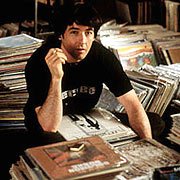I've recently watched the Jordan Peele produced The Twilight Zone, and thoroughly enjoyed Get Out when it came out a few year's ago. I've long made the case that horror is as (or more) necessary as terror, in our daily lives, and I think Peele's horror ouvre, as it continues to unfold in front of us, will provide an object lesson for my argument.
The other night, I watched Us, and was profoundly moved by it (and close to bowel-moved as well it was so freaking scary). It is the story of a fear of an under-class rising up. But this under-class is not comfortably something other. Rather, they are us.The notion is terrifying (as opposed to horrifying). I do not love the quickly accessible distinctions between the two (including the one in my post linked to above); a more fulsome account, if desired. The fear of the revolutionary uprising is something that the progressive / liberal-defining bourgeoisie want to mask. We support (in principle at least) the overthrow of power, and watching these upper middle class families get their come-uppance is, I would argue, a terror movie rather than a horror movie.
But then, Peele does what he has done so marvelously in much of his recent genre work, he extends. If you relish the terror of bourgeois families at their vacation houses getting terrorized and chased around by unknown baddies, then by extension you will cheer to yourself similar harassed and displaced. Of course this (generally) does not hold true, and becomes where we enter the horror genre. The apocalypse for everyone else and adventure / free to wander tale for ourselves is at the heart of the good old 'merican terror story (The Stand, The Road, Revolution, The Postman, et cetera et cetera). We love these tales of terror as long as we are in the less than 0.6% who get to survive Captain Trips.
In Us, when we begin to see the masses of underworlders holding hands in lines across streets, in and out of buildings and over mountain roads, forming an echo (but what's the word for an echo that's louder - more heard!?) of Hands Across America, the implications begin to be horrifying. They are coming for all of us: children and adults, black and white, rich and poor.
For me personally, Hands Across America was already a horror-laden event. In 1986, my two brothers and I piled in to the family station wagon with my dad, leaving my mom at home, and drove south toward central Illinois to join in the not-so-nationwide chain of humanity. On the drive down, the three other boys in the car (7, 14 & 40 years my senior) were discussing apocalypse as some kooky preacher on the radio (and billboards I seem to recall) was predicting Armageddon in the coming days or weeks (evidently it wasn't high-profile enough to make this list, unless perhaps my memories are conflated). My brothers and dad were discussing the concept academically (or at least the childish version of academically; my family, and in particular my dad, are textualist bible-y people, and while they didn't go in for specific predictions of any moment, I do have the sense that they all kind of generally believed in it 'eventually'), and my 8-year-old mind was swallowing it whole, and I was terrified that the end of my existence was mere days away (hours of it to be wasted in the way back of this damned car!).
I don't believe that Jordan Peele tailored his horror story specifically to me, but I am curious (and it's probably too late to note, spoiler-alert) as to what the implications of the film might have been had it not been for the twistNotSoTwist ending. Would Adelaide's (Lupita Nyong'o) doppelganger (Red), who in fact was Adelaide, have seemingly led the uprising had she not come originally from the top side. Revolutionary artists (or perhaps it's more often horror makers) often wind up creating works that actually make arguments quite the contrary to what they themselves believe or would espouse in the real world.
- Thus, is the argument of Us that in order to make revolution, the underside need a spark (inspiration or perhaps permission) from a member of the ruling class?
- Just as the hippie horror-makers (Wes Craven, Tobe Hooper, John Carpenter) wound up making conservative arguments warning about the dangers of teenage promiscuity...
- And a work of horror fiction as seemingly revolutionary as Mark Danielewski's House of Leaves winds up making a very very conservative argument (albeit circuitously).
It's not to say that it's the fault of these brilliant creators that their works wind up making conservative arguments that they'd rather not be making. Rather it's the tricksy nature of working in the media of terror and horror and trying to bridge the gap. It's why a filmmaker like George Romero was less susceptible to falling into the same trap, because he started with the horror and embraced it for its own sake, and the meaning came afterward. When you try to wield the ephemeral (which is what you're doing when you're creating a work of art), it gets slippery, and doesn't always go where it wants.
It's why when the artistic mockery of religion that is televangelist doomsayers like Jack Van Impe and publishing powerhouses like Joel Osteen and religiosity-based "university" educators like Jerry Falwell Jr...
- Ply their craft, they wind up arguing against their personal ownership or understanding of church doctrine, and their political and moral arguments (not to mention their continuing calls for their own personal enrichment) wind up making the case for exactly the opposite of their intent.







